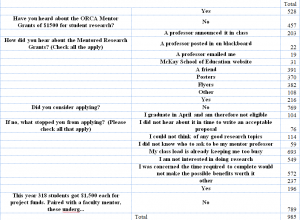Jordan Dille and Dr. Betty Ashbaker, Counseling Psychology Special Education
Goal/Purpose
The BYU Office of Research and Creative Activities (ORCA) provides BYU undergraduates with the unique opportunity to plan and conduct funded research in an area of interest or field of study. No other University provides this type of experience to its students; yet each year only a low percentage of students apply for an ORCA research grant. The aim of my research was to discern the reason for this. My goal was to discover how many students are aware of the ORCA opportunity, and then discern why they either did or did not apply. Through this research I hoped to be able to provide the McKay School of Education some insight into students’ perception of the ORCA process, in order to enhance the ORCA opportunity for both students, and the McKay School of Education.
Significance
In the field of education, continued research and discovery shape future success and goals. New methods are constantly being introduced and it is only through research that we are continually able to better insure the success of our students and colleagues. Every new educator has a responsibility to further this research and knowledge in their respected areas. The more awareness and knowledge the students have of the ORCA grant, the more students will apply and participate. This will further students’ opportunities for research and perpetuate the continuation of such an important process.
Materials
The materials used to conduct my research were flyers that I handed out in classes to each student, and the survey that was distributed and conducted online. No other materials were required or used.
Procedure
I attended many different classes offered in the McKay School of Education. In each class I read a short explanation about what the survey is about, and how the student’s input and participation will be help. The students were asked to be as honest as possible. Each student was given a flyer that had information about the survey as well as website address to get to the survey. After all the surveys had been turned in, the responses were compiled and data collected. The responses were put into different categories depending upon the student’s answers to the questions.
Data
Below is a cross tabulation chart of the all of the surveys that were completed.

Conclusion
I discovered that 54% of the participants had at least some knowledge about the ORCA grant. There are still many students that do not know about the availability of this undergraduate research. Only 216 participates considered applying for the ORCA grant, and only 3% of those participants actually applied. Even after learning more about the ORCA grant, the number only increased from 22% to 25% of students who would consider applying for the next ORCA opportunity. The most common reason for this low percentage was that students already felt that their current class loads and responsibilities were keeping them busy, and that additional responsibility would be a burden. Many also expressed that they had no desire to conduct their own research, or that the benefits of doing the ORCA grant would not be worth the sacrifice and time it would take.
I conclude that there should be a greater effort to educate the student population about the ORCA program. Many of the students who had heard about it expressed the feeling that while they had some knowledge of it, they still did not know enough details to become interested in participating. Students also need to be more encouraged at the class level by professors and program administrators to participate. They need to understand that the benefits and knowledge they can gain from participating will be worth the extra responsibility. With more information about the ORCA grant readily available, the percentages of students who apply and participate should increase.
